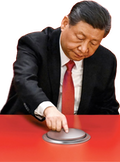“Rectifying disorderly low-price competition among enterprises” is probably the most important one. It sounds like something of the order of “houses are for living, not for speculation”, the expression Xi used to announce the deflation of the real estate bubble.
Xi is saying he wants an end to “involution” (“内卷”, Neijuan), a term he mentions several times in his text, and which is very trendy in China right now. Probably the best translation for it is not actually “involution” but more something akin to “rat race”, “race to the bottom” or “destructive, zero-sum competition”. It doesn’t only relate to businesses, but also to social issues in China like the extreme competition for education, the 996 culture, the feeling of running faster and faster just to stay in the same place.
It’s true that when you look at the current extreme competition in business, it makes everyone worse off: for instance China leads the world in solar because of this competition but when you look at it individual companies’ margins are razor thin, making this quite the pyrrhic victory for individual Chinese companies.
Same thing for education for instance, where you need ever-higher degrees for the same jobs. What once required a bachelor’s now needs a master’s; everyone studies harder but no one is better off.
To call changing all this “major” is even an understatement given how deeply embedded these competitive dynamics are in all layers of Chinese society and economy. This isn’t just tweaking policy at the margins: this is a bit like trying to transform a Formula 1 race into a marathon while the cars are still on the track. He’s right that this is more and more of a problem in Chinese society but at the same time much of China’s current architecture is built around this hypercompetitive model.
What Xi promotes instead is “high-quality development” which, when it comes to business, means innovation and differentiation rather than price wars, sustainable margins and market consolidation.
He doesn’t touch much in his article about the social changes this implies but we got a preview about what that could mean a couple of years ago when China banned the tutoring industry - an attempt to break the education arms race where parents were outcompeting each others to give their kids every possible edge, which wasn’t good for the kids and the families’ wallets. A typical example of “Neijuan.”
Let’s see how this all materializes but the one thing is sure: the level of ambition here is staggering, even by Chinese standards.
https://xcancel.com/RnaudBertrand/status/1967520398112878698
I’m gonna try to interpret what I think I understand from this. Please respond if you think I’m mistaken on something.
“Rectifying disorderly low-price competition among enterprises” is probably the most important one. It sounds like something of the order of “houses are for living, not for speculation”, the expression Xi used to announce the deflation of the real estate bubble.
It sounds like they plan to assert even more control over enterprises. Either getting more “golden shares” or making them more powerful or maybe even full on nationalizing a bunch of importent enterprises.
Xi is saying he wants an end to “involution” (“内卷”, Neijuan), a term he mentions several times in his text, and which is very trendy in China right now. Probably the best translation for it is not actually “involution” but more something akin to “rat race”, “race to the bottom” or “destructive, zero-sum competition”. It doesn’t only relate to businesses, but also to social issues in China like the extreme competition for education, the 996 culture, the feeling of running faster and faster just to stay in the same place.
This probably involve two things:
1 - getting enterprises to give worker more for the same work (so that it’s not necessary for them to work so much overtime), aka probably higher salaries + more benefits.
2 - Taking even more advantage of China’s automation capability. They’ve been working on various robots and AIs capable of automating work to an extent never seen before for a few years now, they’re probably going to go all in on this, even more than before.
It’s true that when you look at the current extreme competition in business, it makes everyone worse off: for instance China leads the world in solar because of this competition but when you look at it individual companies’ margins are razor thin, making this quite the pyrrhic victory for individual Chinese companies.
The only way to deal with this problem while keeping prices low that I can think of is nationalization. So maybe that’s what they’ll do.
Same thing for education for instance, where you need ever-higher degrees for the same jobs. What once required a bachelor’s now needs a master’s; everyone studies harder but no one is better off.
On that point, they may want even more peoples going into engineering and science. Since getting enterprises to be less picky when hiring for engineering or r&d jobs would help with that. Significant given that China dominate in number of patents and cited scientific papers.
What Xi promotes instead is “high-quality development” which, when it comes to business, means innovation and differentiation rather than price wars, sustainable margins and market consolidation.
Innovation and differentiation rather than price war seems consistent with wanting more peoples going into engineering and r&d, wanting to push for more automation, nationalization and wanting workers to get more for the same positions.
https://hexbear.net/comment/6505016
This dude Arnaud Bertrand is always hyping up everything and anything. I guess if you get a XHS take, who hypes nothing ever, you can triangulate how important that stuff is. Its basicaly some general fiscal and market economy signals going into the the next 5YP.
Firstly that some sectors should reign in price wars and consolidate (EVs in particular), and signals the CPC may be ready to pull the plug of this development phase in EVs and some other high tech sectors and eliminate smaller players while keeping the winners and more predictable market practices.
“promote ‘orderly exit’ of outdated capacities”,“improve fiscal systems, statistical frameworks, and credit mechanisms to promote market unity” “rein in ‘chaos’ in local practices of attracting investments”
I guess these are some about local government dept, financial mechanisms, liquidity and swaps. Its signals from the party that some “centrally supervised capital discipline” project is in order and will continue. More importantly liquidating local government financing vehicles (LGFVs) -and the dept accumulated allong the way that everyone has been fearmongering about- that basically acted as a shroud to veil the very undisciplined financial behaviors of local govts. According to this recent gov paper reviewing the last 5 year plan

“By the end of June 2025, over 60% of financing platforms had exited, meaning that over 60% of these platforms’ hidden debts had been eliminated” . Most likely a mix of land collateral asset holding firms and real estate firms getting unwound. The CPC in general seems less concerned about a systemic danger from local dept situation than it was a couple of years ago. Restructuring and cleaning up of local finance has been quitely going on, with some pain of course, and will continue
Also this

from the HB news mega
Xi to announce Burning Crusade Expansion
How do yo immigrate to China?
Step 1. Learn Fluent Mandarin Chinese (Simplified)
Hard to fully immigrate but you can get hired by a company or start your own as WFOE and live there indefinitely by working
sustainable margins
not a word about wage floor
mate is libbing out
I’ll be honest, I read the article and I’m not sure if I’m stupid or if this has nothing to do with the communism button or even increasing domestic consumption while importing rather than exporting. Also it’s from July
“The “five unifications” refer to unifying fundamental market institutions, particularly those related to property rights protection, fair competition, and quality standards; unifying market infrastructure, streamlining logistics, capital flows, and information flows, and improving the modern commercial and trade distribution system; unifying the standards for government behavior, ensuring that local governments have clear rules for what they can and cannot do when promoting economic development, especially attracting investment, and that they cannot act independently; unifying market regulation and law enforcement, clarifying the criteria for administrative penalties for market regulation, and ensuring a uniform standard for all measures; and unifying the markets for factor resources, promoting their free flow and efficient allocation, and reducing resource mismatches and idle waste. The “one opening up” refers to continuously expanding opening up, implementing interconnected domestic and international opening up, and avoiding closed operations.”
Please let me know what phrases are important here
sounds like some of these industries with razor thin margins may need nationalization
indeed, and that’s what’s been increasingly happening incidentally https://www.piie.com/research/piie-charts/2024/chinas-private-sector-has-lost-ground-state-sector-has-gained-share-among
 please Xi
please Xi
The automatic translation I read seems to emphasize a common Chinese market. Could this be the domestic consumer model that @xiaohongshu@hexbear.net (and others) have been pushing for?
seems like it
The common thread I’ve noticed in Chinese policy is an emphasis on taking things slow. Let the market be crazy, then step in when things start getting silly. It gives me hope that China and the US might never fight each other, just let nature takes its course vis a vi the natural death of the empire.
My hunch is that if the US ever attacks China, it’ll be a short war and the US will lose rather quickly. Not based on the current state of their respective militaries, but rather if it ever got to the point that America felt the need to attack China to maintain hegemony, that would mean their hegemony had already slipped to the point of collapse.
That’s my take on it. Americans don’t like real war, they like bullying much smaller, much poorer nations that have little capability to fight back. America will get its fix by continuing to bully people within its own borders, immigrants, BIPOC, LGBTQ+, shitting its own guts out until it’s an emaciated shadow of its former self.
I very much get the impression that’s the strategy China is pursuing. They’re avoiding direct conflict and waiting for the empire to reach the natural end of its life cycle.
I’m not gonna pretend I get what’s being said here, but I think the last year has shown that, for solar specifically, the “overproduction” is absolutely a good thing. Chinese solar overproduction has allowed African and Asian countries to massively increase their renewable energy and begin a fossil-free developmental path. If Chinese solar were not so cheap, it would be impossible for those countries to import so much so quickly.
Maybe China can get a bunch of solar plants set up in other countries so they can cheaply produce their own solar, but they’ll need to move the entire supply chain for that to really work.
I think the idea is to still produce things that are needed, but not do it in a fashion which burns people out and creates aggressive competition within the society.
Following the references brings me here.
BEIJING – An article by Xi Jinping, general secretary of the Communist Party of China (CPC) Central Committee, on further building a unified national market will be published on Tuesday.
The article by Xi, also Chinese president and chairman of the Central Military Commission, will be published in this year’s 18th issue of the Qiushi Journal, a flagship magazine of the CPC Central Committee.
Building a unified national market is essential for creating a new development pattern and promoting high-quality development, according to the article. It notes that advancing the building of a unified national market requires the unification of underlying market institutions, market infrastructure, government conduct, regulatory enforcement, and markets of production factors and resources, as well as the continuous expansion of opening up.
To deepen the building of a unified national market, it is important to focus on key and difficult tasks, such as dealing with the problem of disorderly price competition among some enterprises, and standardizing government procurement and tendering procedures. It is also imperative to regulate local governments’ practices to attract investment, promote the integrated development of domestic and foreign trade, and address shortcomings in legal and regulatory frameworks, according to the article.
Additionally, officials should be guided to have a correct understanding of what it means to perform well, says the article.
Describing the construction of a unified national market as a long and tough task, the article calls for strengthened coordination and cooperation nationwide in building synergy to advance the related work.
Hopefully the actual article gets published in English.
advancing the building of a unified national market requires the unification of underlying market institutions, market infrastructure, government conduct, regulatory enforcement, and markets of production factors and resources, as well as the continuous expansion of opening up.
Someone smarter than me please weight in. Is he pressing the button or not?

He’s like toying with the button I think. Kinda putting pressure on it, maybe giving it a nice rubbing. Doing a little teasing is good, foreplay is important. He’s showing clear intent to eventually press the button though imo
Not pressing the button, literally the opposite
the continuous expansion of opening up
Can he withstand the temptation… [picks Xi up and holds him over to the button] …to push the button that, even now, beckons him closer? [sets Xi on the table and pushes his head towards the button] Will he succumb to the maddening urge to eradicate history? [pounds his butt down on Xi’s head to force him even closer] At the MERE PUSH of a SINGLE BUTTON! [rolls Xi on the table like a rolling pin] The beeyootiful shiny button! [forcefully pushes Xi’s head toward the button again] The jolly candy-like button! Will he hold out, folks? CAN he hold out?
for others who are not familiar with the challenge the unified market is meant to solve, here is an article I found
https://thediplomat.com/2025/07/the-challenge-to-chinas-unified-big-market-drive/
no more half measures walter














